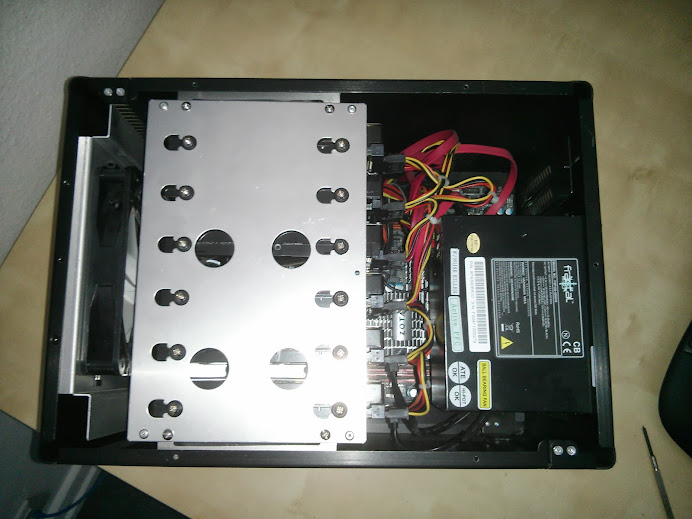warri
Guru
- Joined
- Jun 6, 2011
- Messages
- 1,193
Hello!
I'm posting in Offtopic, because I'm not sure if this is actually a FreeNAS/FreeBSD related issue.
While replaceing some of my disks I noticed that no SMART information seems to be available for one of my drives, a Samsung SpinPoint F4 HD204UI. Manufacturing date is 2011.02, so it should not be affected by the firmware bug for which the warning is issued. It also definitely has SMART capabilities.
Right now my pool is resilvering, but when it's done I could try again with FreeNAS-9.1-RC1 or some Linux OS.
I'm currently running FreeNAS-8.3.1-p2-x64.
Some output:
The other hardware is listed in my signature.
Maybe somebody did already run into the same problem?
I'm posting in Offtopic, because I'm not sure if this is actually a FreeNAS/FreeBSD related issue.
While replaceing some of my disks I noticed that no SMART information seems to be available for one of my drives, a Samsung SpinPoint F4 HD204UI. Manufacturing date is 2011.02, so it should not be affected by the firmware bug for which the warning is issued. It also definitely has SMART capabilities.
Right now my pool is resilvering, but when it's done I could try again with FreeNAS-9.1-RC1 or some Linux OS.
I'm currently running FreeNAS-8.3.1-p2-x64.
Some output:
Code:
# smartctl -a -q noserial /dev/ada0
smartctl 5.43 2012-06-30 r3573 [FreeBSD 8.3-RELEASE-p7 amd64] (local build)
Copyright (C) 2002-12 by Bruce Allen, http://smartmontools.sourceforge.net
=== START OF INFORMATION SECTION ===
Model Family: SAMSUNG SpinPoint F4 EG (AFT)
Device Model: SAMSUNG HD204UI
Firmware Version: 09570115
User Capacity: 2,000,398,934,016 bytes [2.00 TB]
Sector Size: 512 bytes logical/physical
Device is: In smartctl database [for details use: -P show]
ATA Version is: 7
ATA Standard is: Exact ATA specification draft version not indicated
Local Time is: Tue Jul 23 18:55:41 2013 CEST
==> WARNING: Using smartmontools or hdparm with this
drive may result in data loss due to a firmware bug.
****** THIS DRIVE MAY OR MAY NOT BE AFFECTED! ******
Buggy and fixed firmware report same version number!
See the following web pages for details:
http://knowledge.seagate.com/articles/en_US/FAQ/223571en
http://sourceforge.net/apps/trac/smartmontools/wiki/SamsungF4EGBadBlocks
SMART support is: Available - device has SMART capability.
SMART support is: Enabled
=== START OF READ SMART DATA SECTION ===
SMART overall-health self-assessment test result: PASSED
General SMART Values:
Offline data collection status: (0x00) Offline data collection activity
was never started.
Auto Offline Data Collection: Disabled.
Total time to complete Offline
data collection: ( 0) seconds.
Offline data collection
capabilities: (0x00) Offline data collection not supported.
SMART capabilities: (0x0000) Automatic saving of SMART data is not implemented.
Error logging capability: (0x00) Error logging NOT supported.
No General Purpose Logging support.
SMART Error Log not supported
SMART Self-test Log not supported
Device does not support Selective Self Tests/LoggingCode:
# smartctl -t short /dev/ada0 smartctl 5.43 2012-06-30 r3573 [FreeBSD 8.3-RELEASE-p7 amd64] (local build) Copyright (C) 2002-12 by Bruce Allen, http://smartmontools.sourceforge.net === START OF OFFLINE IMMEDIATE AND SELF-TEST SECTION === Warning: device does not support Self-Test functions. Sending command: "Execute SMART Short self-test routine immediately in off-line mode". (pass0:ahcich0:0:0:0): SMART. ACB: b0 d4 01 4f c2 40 00 00 00 00 00 00 (pass0:ahcich0:0:0:0): CAM status: ATA Status Error (pass0:ahcich0:0:0:0): ATA status: 51 (DRDY SERV ERR), error: 04 (ABRT ) (pass0:ahcich0:0:0:0): RES: 51 04 01 4f c2 40 00 00 00 00 00 Command "Execute SMART Short self-test routine immediately in off-line mode" failed: No error: 0
Code:
# camcontrol identify ada0 pass0: <SAMSUNG HD204UI 09570115> ATA-7 SATA 2.x device pass0: 300.000MB/s transfers (SATA 2.x, UDMA6, PIO 512bytes) protocol ATA/ATAPI-7 SATA 2.x device model SAMSUNG HD204UI firmware revision 09570115 serial number <omitted> cylinders 16383 heads 16 sectors/track 63 sector size logical 512, physical 512, offset 0 LBA supported 268435455 sectors LBA48 supported 3907029168 sectors PIO supported PIO4 DMA supported WDMA2 UDMA6 Feature Support Enabled Value Vendor read ahead yes yes write cache yes yes flush cache yes yes overlap no Tagged Command Queuing (TCQ) no no Native Command Queuing (NCQ) no SMART yes yes microcode download no no security yes no power management yes yes advanced power management yes no 0/0x00 automatic acoustic management no no media status notification no no power-up in Standby no no write-read-verify no no unload no no free-fall no no data set management (TRIM) no
The other hardware is listed in my signature.
Maybe somebody did already run into the same problem?

